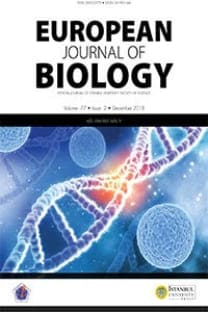Mohamed IBRAHİM, İbrahim ALARAİDH, Azura AMİD, Abd-el Aziem FAROUK, Salih BAZAİD, Ralf GREİNER, Abdullah ALGHUNAİM
Detection of genetically modified rice: Collaborative validation study of a PCR based detection of genetically modified rice Oryza sativa commercially available in Saudi Arabia
A collaborative trial study has been conducted for validation of an extraction method and a subsequent PCR for the detection of transgenic rice sold in Saudi Arabia. The tests were carried out in Saudi Arabia using Real-Time PCR and the positive samples were validated in another lab in Malaysia using PCR and agarose gel visualization. The samples were tested for the existence of the NOS Terminator. A total of 150 samples were tested out of which three samples tested positive as GM-rice which were retested in Malaysia. The presence of GMO rice in Saudi Arabia supports the necessity of developing precise quantitative and qualitative ways for routine analyses and detection of GMO products in the Saudi Arabian market. With the discovery of GM products in the Saudi Arabian market it would be of no surprise that other Middle Eastern nations also knowingly or unknowingly import GM crops.
Keywords:
-,
___
- Aril S, Cakir O (2008) Detection of genetically modified soy in processed foods sold commercially in Turkey by PCR-based method. The 1st Global Conference on GMO Analysis (organized by the Joint Research Commission) in Villa Erba, Como, Italy. of the European mediated transformation of
- Hayakawa T., Zhu Y., Itoh K., Kimura Y., Izawa T. and Shimamoto K. (1992) Genetically engineered rice resistant to rice stripe virus, an insect-transmitted virus. Proceedings of National Academy of Sciences of the United States of America, 89: 9865–9869.
- Hemmer W. (1997) Foods derived from modified genetically detection methods. BATS. Available on the Internet www.bats.ch/abstr/297intro.htm. and at:
- Huang J., Rozelle K., Pray S., and Wang Q. F. (2002) Plant biotechnology in China. Science, 295: 674–677.
- Irie K., Hosoyama M., Takeuchi H., Iwabuchi T., Watanabe K. and Abe H.M.(1996) Transgenic rice established to express corn cystatin exhibits strong inhibitory activity against insect gut proteinases. Plant Molecular Biology, 30:149–157.
- Jia S. R. and Peng Y. F. (2002) GMO Biosafety research in China. Environmental Biosafety Research, 1: 5–8.
- Khush G. S. (2005) What it will take to feed 5.0 Billion rice consumers in 2030. Plant Molecular Biology, 59: 1–6.
- Lin W., Anuratha C. S., Datta K., Potrykus I., Muthukrishnan S. and Datta S. K. (1995) Genetic engineering of rice for resistance to sheath blight. Biotechnology, 13:686–691.
- Liu Y.F., Wang F., You M.S., Wang Q., Hu S.Q., Liu W.H. and Zhao S.X.(2005) Scientific Agriculture Singapore 38 :725.
- Messeguer J., Fogher C., Guiderdoni E., Marfa V., Catala M. M. and Baldi G. (2001) Field assessment of gene Xow from transgenic to cultivated rices (Oryza sativa L.) using a herbicide resistance genes as tracer marker. Theoretical 103:1151–1159. Applied Genetics,
- Soon-Chun J., Pack I. S., Cho E.Y., Youk E. S., Park S., Yoon W. K., Kim C.G., Choi Y. D., Kim J.K. and Kim H.M.(2007) Molecular analysis and quantitative detection of a transgenic rice line expressing a bifunctional fusion TPSP. Food Control 18: 1434–1442.
- Ye X., Al-Babili S., ölKti A., Zhang J., Lucca P. and Beyer P. (2000) Engineering the provitamin A (β-carotene) biosynthetic pathway endosperm. Science, 287: 303–305. rice
- Zhang Y.J., Zhao H.Y., Wu K.M., Zhao K.J., Peng Y.F. and Guo Y.Y.(2007) Screening method for the identification of genetically modified organism (GMO) in food. DG JRC, Environment Institute, Consumer Protection & Food Unit. Chiness. Journal of Applied Environmental Biology. 13 : 220.
- ISSN: 2602-2575
- Yayın Aralığı: Yılda 2 Sayı
- Başlangıç: 1940
- Yayıncı: İstanbul Üniversitesi Yayınevi
Sayıdaki Diğer Makaleler
Sığacık Körfezi’ndeki (Ege Denizi, Türkiye) sekiz dekapod krustasenin boy-ağırlık ilişkisi
Mohamed IBRAHİM, İbrahim ALARAİDH, Azura AMİD, Abd-el Aziem FAROUK, Salih BAZAİD, Ralf GREİNER, Abdullah ALGHUNAİM
Pelin ARDA PİRİNCCİ, Pınar TURAN, Serap ARBAK, Sehnaz BOLKENT
Türkiye’nin Trakya bölgesinde hayvan yemlerindeki eser element konsantrasyonları
Murat BELİVERMİŞ, Önder KILIÇ, Tulay ENGİZEK, Saim ERGENÇ, Akın ÇAYIR
